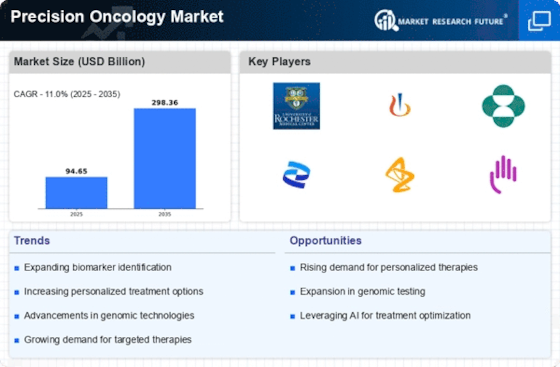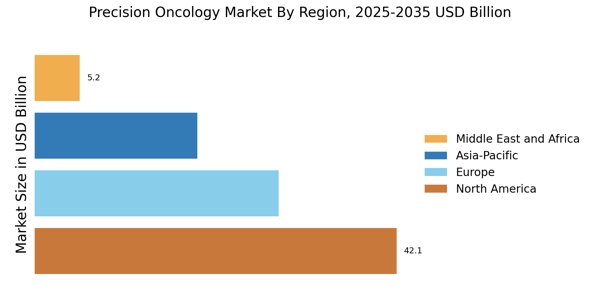Increasing Incidence of Cancer
The rising incidence of cancer worldwide is a primary driver for the Precision Oncology Market. As cancer cases continue to escalate, the demand for personalized treatment options intensifies. According to recent statistics, cancer is projected to affect approximately 1 in 3 individuals during their lifetime. This alarming trend necessitates innovative approaches to treatment, thereby propelling the growth of precision oncology. The Precision Oncology Market is expected to witness substantial growth, with estimates suggesting a compound annual growth rate of over 10% in the coming years. This growth is largely attributed to the increasing need for tailored therapies that address the unique genetic makeup of tumors, enhancing treatment efficacy and patient outcomes.
Advancements in Genomic Technologies
Technological advancements in genomic sequencing and analysis are significantly influencing the Precision Oncology Market. The development of next-generation sequencing (NGS) technologies has revolutionized the ability to analyze genetic information rapidly and accurately. This has led to a surge in the identification of actionable mutations, enabling the design of targeted therapies. The Precision Oncology Market is experiencing a transformation, with the market for genomic testing projected to reach several billion dollars by the end of the decade. These advancements not only facilitate personalized treatment plans but also enhance the understanding of cancer biology, thereby driving further research and development in the field.
Growing Investment in Cancer Research
The increasing investment in cancer research is a crucial driver for the Precision Oncology Market. Governments, private organizations, and philanthropic entities are allocating substantial funds to support innovative research initiatives aimed at understanding cancer at a molecular level. This influx of capital is fostering collaborations between academic institutions and biotechnology companies, leading to the development of novel therapies. The Precision Oncology Market stands to benefit from these investments, as they enable the exploration of new biomarkers and therapeutic targets. It is anticipated that the market will expand significantly as more research translates into clinical applications, ultimately improving patient care.
Rising Awareness of Personalized Medicine
There is a growing awareness and acceptance of personalized medicine among healthcare professionals and patients, which is driving the Precision Oncology Market. As patients become more informed about their treatment options, they increasingly seek therapies that are tailored to their specific genetic profiles. This shift in patient expectations is prompting healthcare providers to adopt precision oncology approaches, thereby enhancing treatment outcomes. The Precision Oncology Market is likely to see a surge in demand for personalized therapies, with market analysts predicting a significant increase in the adoption of genomic testing and targeted treatments in the near future. This trend underscores the importance of educating both patients and providers about the benefits of precision oncology.
Regulatory Support for Innovative Therapies
Regulatory bodies are increasingly supporting the development and approval of innovative therapies within the Precision Oncology Market. Initiatives aimed at expediting the review process for breakthrough therapies are encouraging pharmaceutical companies to invest in precision oncology. The introduction of programs such as the FDA's Breakthrough Therapy Designation has facilitated faster access to promising treatments for patients. This regulatory support is likely to enhance the growth of the Precision Oncology Market, as it encourages the development of novel therapies that target specific genetic alterations. As a result, the market is expected to expand, driven by the introduction of new, effective treatment options that meet the evolving needs of cancer patients.

















